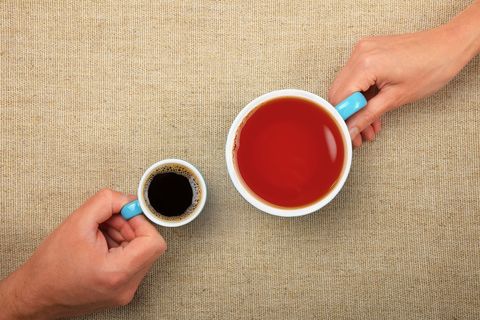Home » Diet & Food »
Tea Vs. Coffee: It's The Ultimate Smackdown

The tea vs. coffee wars are real, y’all.
Sure, they both contain caffeine, but coffee devotees will swear hands-down that people who sip only tea are pretty much aliens, right? Meanwhile, tea guzzlers preach that the health benefits of tea are just so much better.
But when it comes to tea vs. coffee, is one better for you?
Here’s the good news: tea and coffee are both pretty healthy (especially at their simplest forms, sans added sugar or flavorings).
“There is more existing research on tea, but we’ve been finding out a lot on coffee too,” says Jess Cording, R.D. “I think they both can be part of a healthy diet if you feel well when you drink them.”
Still, there are some health benefits and downsides specific to each bevvie that you should probably note.
Coffee benefits = longer life + better memory
While you may be drawn to coffee for its jolt, these roasted beans offer so much more than just caffeine. “Research suggests that coffee consumption may help prevent chronic diseases such as diabetes, hypertension, and liver disease,” says Nicole Hahn, R.D.N., a clinical dietitian at Banner – University Medical Center Phoenix.
A 2018 study of half a million people published in the journal JAMA Internal Medicine also found that the more coffee people drank (up to eight cups a day!), the lower their risk of dying during the 10-year study period.
Coffee may also protect memory and brain function. “One study found that drinking up to three cups of coffee daily was associated with a 65 percent decreased risk of Alzheimer’s disease,” says Hahn.
Your morning brew may boost your emotional wellbeing too. “Because coffee is at the center of so many social interactions, that act of connecting with someone over a cup of coffee can have mental health benefits as well,” says Cording.
There’s been some hype about coffee causing cancer…
A California judge recently made headlines after ruling that coffee companies should put a cancer warning label on their products. That’s because of acrylamide, a compound found in roasted coffee beans that’s been linked to cancer in rats.
But that’s just overblown, says Hahn. “Little evidence suggests that coffee is linked to cancer,” she says. She adds that coffee contains polyphenols and antioxidants that actually protect against inflammation and the development of certain cancers, and has been linked in multiple studies to reduced risk of endometrial and colorectal cancers. (FWIW, the American Institute of Cancer Research also came out against the ruling.)
Tea benefits = stronger immune system + lower cancer risk + stronger bones
There’s no denying that tea has a pretty virtuous reputation. “Regular tea consumption has been associated with lower body weight, improved immune system function, and decreased risk of heart attack and stroke,” says Cording.

Other upsides? Tea drinkers may have higher bone density and a lower risk of fracture. Drinking green tea may also protect your brain and help you feel relaxed too. “Green tea contains the amino acid L-theanine, which triggers the release of GABA neurotransmitter and helps people enter a relaxed state of mind,” says Ashley Amaral, cardiovascular ICU registered dietitian at Banner – University Medical Center Phoenix.
Tea’s lengthy list of health benefits is due in large part to its and anti-inflammatory properties and abundant antioxidants. “Green and black tea contain more antioxidants than coffee,” says Amaral. “In addition, tea contains catechizes and flavonoids, which are antioxidants that protect against environmental stress.”
The downside of tea and coffee: caffeine.
“Caffeine is a stimulant and affects multiple systems in the body,” says Amaral. “It can impact the nervous system, making a person jittery or hyperactive, increase heart rate and/or blood pressure, and cause some gastrointestinal discomfort.”
The USDA recommends that people consume no more than 400 milligrams of caffeine per day (otherwise, you risk those unpleasant side effects). Caffeine levels can vary widely among drinks (depending on the brew, the size of the drink, etc) but here’s generally how each drink breaks down:
In moderation (a.k.a. below 400 milligrams per day), caffeine is relatively harmless. Some people can even have more and be fine. But, Amaral says, everyone metabolizes caffeine differently—and some people might be more sensitive to it than others.
“Some people who are very sensitive to caffeine may still find they get the jitters from green or black tea,” adds Cording. And, while herbal teas are caffeine-free, check with your doctor about potential health risks or interactions, especially if you’re pregnant, have a medical condition, or are taking medication, she says.
The bottom line: Tea vs coffee? Both are pretty great, TBH. As long as you’re mindful of the caffeine, either of them can be a part of a healthy diet.
Source: Read Full Article


